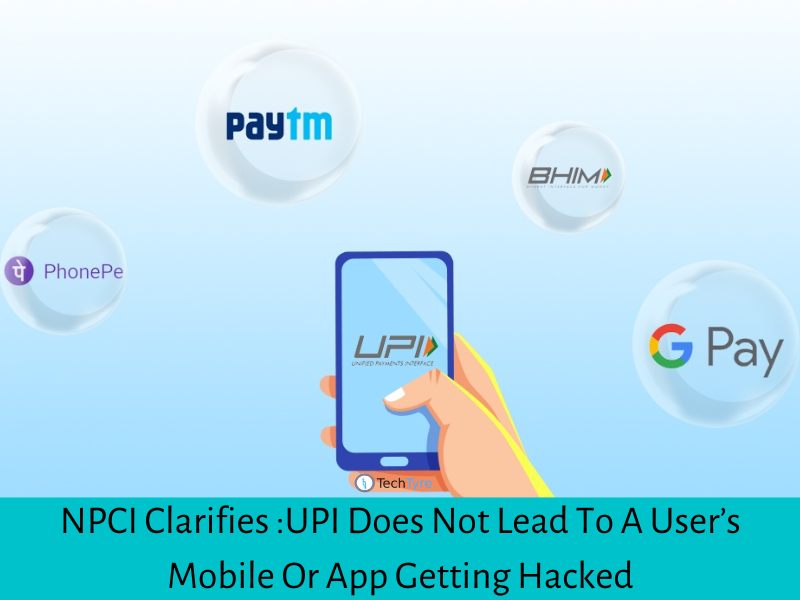NPCI’s Twitter post says that the connection to UPI in some media and social media articles on KYC scam is ‘misleading and incorrect’.
UPI Transaction New Rules: The NPCI further clarified that there are no charges for the bank account to bank account-based UPI payments i.e. normal UPI payments.
National Payments Corporation of India (NPCI) has issued a statement clarifying that UPI – Unified Payment Interface does not expose user’s KYC details. It further states that UPI payments can not result in a hacker getting access to user’s phone or the app itself.
A media statement was issued by NPCI via a post on microblogging site Twitter. “NPCI Media Statement: NPCI, 28th March 2023. UPI does not expose the sender’s KYC details and neither does it lead to a user’s mobile or App getting hacked,” the post reads.
NPCI’s Twitter post says that the connection to UPI in some media and social media articles on KYC scam is ‘misleading and incorrect’. Explaining how UPI works, it says that UPI works on the principle of payment using a Virtual Payment address or UPI ID — using secure method of device binding and UPI PIN to transfer money. Sender’s KYC details are not used or shared during a UPI transaction, it further mentions.

Here’s the complete statement as shared by the official Twitter handle of NPCI:
With reference to recent media/social media articles on ‘KYC scams’ – The connection to UPI is misleading and incorrect. We assure all users that any payment through UPI does not expose the sender’s KYC details and neither does it lead to a user’s mobile or App getting hacked.
UPI works on the principle of payment using a Virtual Payment address or UPI ID — using secure method of device binding and UPI PIN to transfer money. KYC details are not used or shared during a UPI transaction. We would like to reassure that UPI continues to remain a safe and secure payment method. The intention of some of these articles/ social media messages are to mislead and thereby create mistrust about a payment method that has been adopted widely across the country.
UPI Transaction New Rules: The National Payment Corporation of India (NPCI) on its official Twitter handle issued a statement clarifying that customers will not have to pay any charge for transactions on UPI. According to recent guidelines, the interchange charges are applicable for Prepaid Payment Instruments (PPI). It means that UPI transactions made via PPIs such as wallets, and credit cards will have an interchange fee of 1.1%.
Earlier, the NPCI had notified that an interchange fee of up to 1.1 per cent will be applicable on merchant UPI (Unified Payments Interface) transactions from April 1. In the notification, the NPCI said that using Prepaid Payment Instruments (PPIs) for transactions through UPI will attract an interchange fee. The charges will be imposed if the transaction is more than Rs 2,000.
Notably, the interchange fee will vary for the different categories of merchants and it will range from 0.5% to 1.1% and a cap is also applicable in certain categories.
However, the NPCI issued another notification on Wednesday and said the introduced fee is only applicable for merchant transactions made through prepaid payment instruments and no charges will be imposed on normal UPI payments which it termed as “bank account- to-bank account based UPI payments.”
The NPCI further clarified that there are no charges for the bank account to bank account-based UPI payments i.e. normal UPI payments. “With this addition to UPI, the customers will have the choice of using any bank accounts, Rupay Credit card and prepaid wallets on UPI enabled apps,” the NPCI said.
As per a report by CNBC TV-18, for telecom, education, and utilities/post office, the interchange fee is 0.7% and for supermarkets the fee is 0.9% of the transaction value. And 1% charges will be imposed for insurance, government, mutual funds, and railways, 0.5% for fuel, and 0.7 for agriculture, the report claimed. These charges will be applicable from April 1.
The users must note that the interchange will not be applied in the case of peer-to-peer (P2P) and peer-to-peer-merchant (P2PM) transactions and the PPP issuers will be required to pay 15 basis points (bps) to the remitter bank as a wallet-loading charge for transactions of over Rs 2,000.



